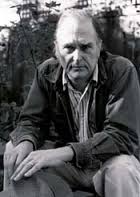Clark Coolidge Biography
Born and raised in Providence, Rhode Island, experimental poet and jazz musician Clark Coolidge has been connected to both the Language movement and the New York School. His poetry utilizes syntactical and sonic patterns to engage, and generate, meaning. In a 1968 poetics statement, he noted, “Words have a universe of qualities other than those of descriptive relation: Hardness, Density, Sound-Shape, Vector-Force, & Degrees of Transparency/Opacity.” Reviewing Coolidge’s collection This Time We Are Both (2010), Olga Zilberbourg observed, “[It] is not a work of a cultural tourist, and neither is it a work of an artist whose sole interest is in creating wordscapes. In this long poem, Coolidge is a mature poet who is aware not only of the deep cultural contexts of his words, but also is aware of his poetry being read in political contexts.”
Coolidge’s numerous collections of poetry include This Time We Are Both (2010); Sound as Thought (1990), which was chosen for the New American Poetry Series; Own Face (1978); and Flag Flutter & U.S. Electric (1966). His work is included in An Anthology of New York Poets (1970) and The Young American Poets (1968).
A contributing editor for Sulfur, Coolidge lives in Petaluma, California.
I look in that one kind of dwindled. And in this,
look up, a truncheon in my fist, tin pot
on my head, the war. My father, I'm looking at, is my
...
In edges, in barriers the tonal light of t
the one thing removed overemphasizes tonally
and you could hurry it, and it vanish and plan
...
When you get in on a try you never learn it back
umpteen times the tenth part of a featured world
in black and in back it's roses and fostered nail
...
But it says nothing. And one is as quiet
as if to say nothing moves me. Then
there is the chair. And one speaks of
...
But it could not be brought to see what it
could be brought. And the leaves are
away again, teamed. A parent at the
...
